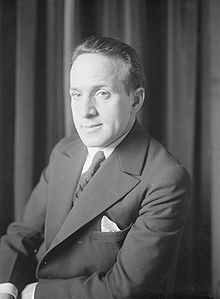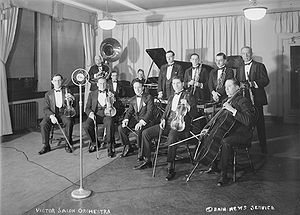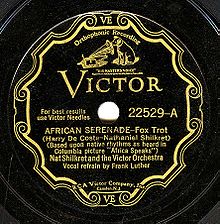- Nathaniel Shilkret
-
Nathaniel Shilkret 
Nat Shilkret circa 1920sBackground information Also known as Nat Shilkret Born December 25, 1889 Origin New York City, U.S. Died February 18, 1982 (aged 92)
Franklin Square, NY, U.S.Occupations Composer, musician, conductor, A&R Instruments Clarinet, piano Nathaniel Shilkret (December 25, 1889 – February 18, 1982) was an American composer, conductor, clarinetist, pianist, business executive, and music director born in New York City, New York to an Austrian immigrant family.[1][2]
Contents
Early career
Shilkret was born to a musical family. His father played almost every instrument, and made certain that Nat and his three brothers were all accomplished musicians at an early age. Older brother Lew Shilkret was a fine pianist, but also worked in the insurance industry. Younger brother Jack Shilkret had a career that paralleled Nathaniel's career: he played clarinet and piano, recorded extensively, and conducted and played piano on the radio and in motion pictures. The youngest brother Harry Shilkret was a medical doctor, who worked his way through school playing trumpet, and continued to play trumpet frequently in Nathaniel's orchestras, particularly for radio broadcasts, long after he was a practicing allergist. Nathaniel Shilkret's brother-in-law, Nathaniel Finston, was violinist in many organizations in his youth and was musical director for Paramount and later for MGM, at one time being Nathaniel Shilkret's boss.
Shilkret was a child prodigy, touring the country with the New York Boys' Orchestra from the ages of seven to thirteen as their clarinet soloist. From his late teens to mid-twenties he was a clarinetist in the best New York music organizations, including the New York Philharmonic Society (under Vassily Safanov and Gustav Mahler), the New York Symphony Orchestra, the Metropolitan Opera House Orchestra, the Russian Symphony Orchestra, Victor Herbert's Orchestra, Arnold Volpe's Orchestra, Sousa's Grand Concert Band, Arthur Pryor's Band, and Edwin Franko Goldman's Band. He was also a rehearsal pianist for Walter Damrosch, playing for stars that included dancer Isadora Duncan.
He joined the Foreign Department of the Victor Talking Machine Company (later to become RCA Victor) around 1915, and soon was made manager of the department.[1][2][3]
In 1926 he became "director of light music." He made many thousands of recordings, possibly more than anyone in recording history. His son Arthur estimated the sales of these records was of the order of 50 million copies. He was the conductor of choice for many of Victor's innovative recordings. He conducted the first record made by the "electric method," the first commercial Victor LP (in 1931!) and was the first conductor to successfully dub an electrically recorded orchestra background over the recordings of Enrico Caruso, Victor's star artist, who died before the vastly superior electrical recording method was developed. He conducted the orchestra for the premier recording of George Gershwin's symphonic poem An American in Paris, in 1929. This recording was one of five recordings conducted by Nathaniel Shilkret that eventually earned Grammy Awards.
Radio and the recording studio
He was also one of radio's earliest stars, estimating that he made over 3000 broadcasts between 1925 and 1941, including being the conductor for The Eveready Hour, regarded as the first major commercial broadcast and the first major variety show. His sponsors included Camel, Carnation, Chesterfield, Esso (now ExxonMobil), Eveready, General Electric, General Motors, Hires Root Beer, Knickerbocker, Lysol, Maxwell House, Mobil Oil (now ExxonMobil), Palmolive, RCA Victor, Salada tea and Smith Brothers' Cough Drops.
Between his conducting for records and for radio, virtually every musical star of the day performed under the baton of Nathaniel Shilkret. His orchestra members included Jimmy Dorsey, Tommy Dorsey, Benny Goodman, Lionel Hampton, Glenn Miller, Artie Shaw, Mike Mosiello and Del Staigers. George Gershwin, Jascha Heifetz, Mischa Elman and Andrés Segovia all played under his direction. Opera stars Rose Bampton, Lucrezia Bori, Feodor Chaliapin, Jon Crain, Richard Crooks, Miguel Fleta, Emilio de Gogorza, Amelita Galli-Curci, Mary Garden, Beniamino Gigli, Helen Jepson, Maria Jeritza, Giovanni Martinelli, Nino Martini, John McCormack, James Melton, Grace Moore, Jan Peerce, Lily Pons, Rosa Ponselle, Elisabeth Rethberg, Gladys Rice, Tito Schipa, Gladys Swarthout, John Charles Thomas, and Lawrence Tibbett were all conducted by Nathaniel Shilkret. The lists of popular singers and foreign artists that played under his direction are just as impressive.
Compositions
He composed and arranged thousands of pieces. His best-known popular composition was The Lonesome Road, first sung by co-writer Gene Austin and later by Jules Bledsoe (dubbing Stepin Fetchit) in the final scene of the 1929 part-talkie film version of "Show Boat", and recorded by more than two hundred artists, including Louis Armstrong, Bing Crosby, Frank Sinatra and Paul Robeson. He composed the theme song Lady Divine for the Academy Award winning film The Divine Lady in 1929. He also composed the theme song Some Sweet Day for the film Children of the Ritz in the same year. His composition Jeannine, I Dream of Lilac Time sold almost two million copies of sheet music and was also recorded by over a hundred top artists, including Louis Armstrong, Skitch Henderson, Guy Lombardo, The London Philharmonic Orchestra, John McCormack, Mitch Miller, Hugo Montenegro, The Platters, and Lawrence Welk. His composition Concerto for Trombone was premiered in 1945 by Tommy Dorsey, playing with the New York Symphony Orchestra, under the direction of Leopold Stokowski. The piece was unavailable to the public from the mid-1950s until Scottish trombonist Bryan Free rescued it from anonymity in the beginning of this century. It was re-premiered at Carnegie Hall by the New York Pops, under the direction of Skitch Henderson, with Jim Pugh as soloist. Since its revival, the Concerto for Trombone has been performed about sixty times (with more performances scheduled) in the United States, Canada and several European countries.
Later career
Shilkret moved to Los Angeles in 1935 and there contributed music scores and musical direction for a string of Hollywood films for RKO (as musical director from 1935—1937) and MGM (as a musical director from 1942—1946). His films included Mary of Scotland (1936), Swing Time (1936), The Plough and the Stars, and Shall We Dance? (1937) and several films of Laurel and Hardy. He also received an Oscar nomination for his work scoring the film version of Maxwell Anderson's stage drama Winterset (1936).
In 1939, he conducted a group of soloists (including tenor Jan Peerce) and the Victor Symphony Orchestra for RCA Victor's multi-disc tribute to Victor Herbert, which were recorded following a special NBC radio broadcast, and he recorded a number of other albums in 1939 and 1940. Due to a serious abdominal operation for cancer removal, he did not conduct for most of 1941.
He worked at RKO-Pathe, making short films from 1946 through the mid-1950s. He was the pit orchestra conductor for the Broadway show Paris '90 in 1952. He lived in his son's home in Franklin Square, NY, from the mid-1950s until his death in 1982.
References
- ^ a b Shilkret, Nathaniel, ed. Shell, Niel and Barbara Shilkret, Nathaniel Shilkret: Sixty Years in the Music Business, Scarecrow Press, Lanham, Maryland, 2005. ISBN 0810851288
- ^ a b Shilkret, Nathaniel, Barbara Shilkret, and Niel Shell, Feast or Famine: Sixty Years in the Music Business, archival edition of Shilkret autobiography, 2001 (copies deposited in the New York Public Library for the Performing Arts, The City College of New York Archival Library, The New York Philharmonic Archives, The Victor Archives (SONY)).
- ^ Shell, Niel, Nathaniel Shilkret: A Most Prolific and Diverse Creator of Recorded Sound, ARSC Journal, 39 (2008), 80--90.
External links
- Nathaniel Shilkret at the Internet Movie Database
- Nat Shilkret
- Nathaniel Shilkret entries in the Encyclopedic Discography of Victor Recordings (University of California, Santa Barbara).
- Franz Liszt, written and directed by James A. Fitzpatrick; fictional 11-minute 1925 film short about Franz Liszt; Nathaniel Shilkret appears, conducting his orchestra.
Categories:- 1889 births
- 1982 deaths
- American composers
- Musicians from New York
- Jewish composers and songwriters
- Victor Records artists
Wikimedia Foundation. 2010.


